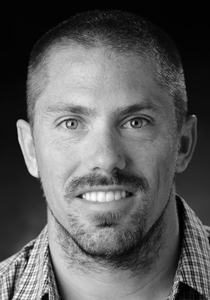
AGU has recognized Prof. Kristopher B. Karnauskas with the 2017 Ocean Sciences Early Career Award “for important contributions to better understanding the tropical oceans and atmosphere.” Kris is a member of the Department of Atmospheric and Oceanic Sciences, the Cooperative Institute for Research in Environmental Sciences, and the School of Public Health at the University of Colorado. Kris also serves as editor of the Journal of Geophysical Research: Oceans and is on the Scientific Steering Committee of the U.S. CLIVAR Program.
Kris’s interdisciplinary research bridges oceanography and atmospheric science as well as marine ecosystems and human health. His most significant work is on the equatorial Pacific Ocean, which has influenced physical oceanography, climate modeling, and conservation policy. Building on ideas going back to his Ph.D. thesis, Kris and his colleagues recently shed new light on the unique and complex relationship between equatorial dynamics, island ecosystems, and the broader coupled climate system. This work shows that climatic changes over the past 35 years have expanded the upwelling near the Galápagos, helping endangered penguins double their population, and that the geologic development of a key part of the Galápagos archipelago about 1.6 million years ago profoundly altered the equatorial circulation, yielding nutrients prompting the famous biodiversity of the islands.
Looking upward, Kris found that 73% of small island nations, supporting a population of 18 million people, are likely to experience significant drying as the climate warms. Kris and a former postdoc devised a new tool for predicting seasonal hurricane activity with remarkable hindcast performance and a successful first real-time forecast in 2016.
Kris loves teaching undergraduates and leading his research group. He mentors postdoctoral and graduate students, as well as undergraduate and even local high school students. His lab frequently hosts underrepresented students through National Center for Atmospheric Research and University of Colorado summer programs.
—Brian Toon, University of Colorado Boulder

On behalf of the journal, AGU, and the scientific community, the editors of Geophysical Research Letters would like to sincerely thank those who re...





